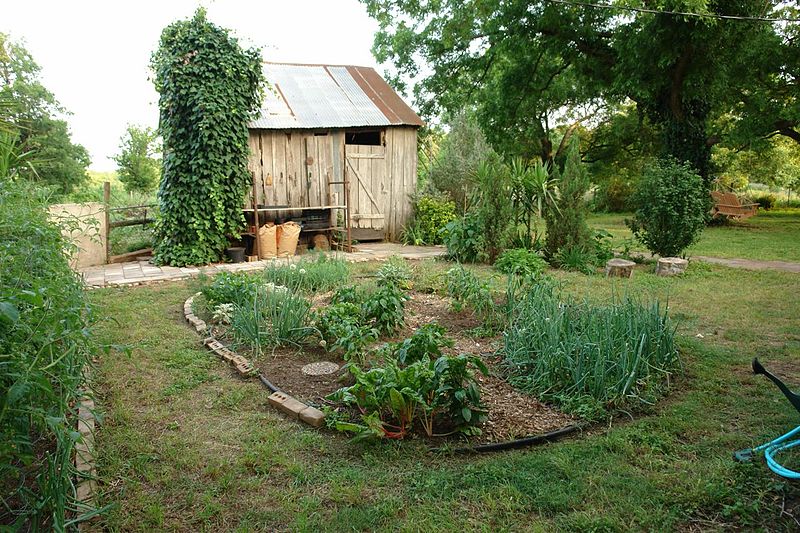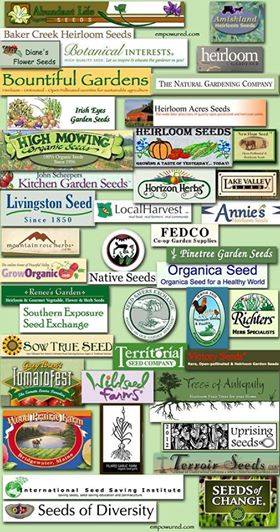Table of Contents[Hide][Show]

Seed catalogs for the upcoming growing season are arriving in mailboxes across the Northern Hemisphere with home growers everywhere starting to plan which seeds they will sow in freshly composted garden. A positive trend in recent years is the growing number of gardening enthusiasts choosing to plant gardens using organic and/or heirloom seeds.
What most of these home gardeners don’t realize is that corporate behemoth and GMO titan Monsanto has been gobbling up the seed market faster than a caterpillar can munch a tomato plant! With one fell swoop in 2005, Monsanto grabbed approximately 40% of the US vegetable seed market with its acquisition of Seminis.
This means that a home gardener could unknowingly be supporting the development and proliferation of genetically modified crops if the seeds used are from Seminis. In addition, Monsanto now apparently owns the trademark for many of the names of the heirloom seed varieties themselves!
Planting a sustainable home garden is much more than just choosing certified organic seeds and seedlings, eschewing pesticides/herbicides and using organic compost. This is because Monsanto has cleverly positioned itself to make money off the home gardening trend.
Does this mean that even if you buy organic or heirloom seeds from a completely independent company some of your purchase might be supporting the bad guys?
Yes, it does.
Surprise!
Home gardeners would do well to bone up on where to purchase their seeds so they aren’t inadvertently doing business with companies that maintain a working relationship with Monsanto-Seminis or were acquired by them.
Buying Organic or Heirloom Seeds Without Supporting Monsanto
Here are the recommended steps for the 2014 growing season for those who want to truly strike a blow for sustainability in every way with their home gardens:

Avoid buying from the seed companies affiliated with Monsanto. Here’s a list of these seed companies by location (enter you zipcode for a list of dealers to avoid).
- Buy from companies Monsanto HASN’T bought and are not affiliated or do business with Seminis: The graphic above indicates numerous companies that are worthy of your patronage as compiled by the International Seed Saving Institute. Please note that this many not be a complete list. If your seed company does not appear, just be sure to clarify with the owner about any potential affiliation with Monsanto-Seminis before buying from them.
- Avoid buying heirloom varieties for which Monsanto owns the trademark.
- Ask seed companies if they have taken the Safe Seed Pledge. Here’s a list of companies that have taken the Safe Seed Pledge and believe in responsible plant genetics. These are good companies to buy from.
Background on Monsanto’s Quest for World Seed Domination
Monsanto’s corporate quest is clearly to make money on each and every one of us whether we choose to eat supermarket frankenfoods produced with abominable, patented GM crops or carefully plant and tend an organic garden at home. Here’s some background information on the subject you may find interesting as well as enlightening:
If you are a home gardener and have information to contribute regarding these steps, please add to the discussion in the comments section. Also, please spread the word via gardening forums you may participate in that folks need to be very careful when seed sourcing for their spring gardens this year else they might be unknowingly supporting Monsanto.
Let’s make this the year when Monsanto’s grip on the worldwide seed market loosens and the movement to seed sustainability gains momentum!
Update
The day after this article was originally published in 2013, the CEO of a large GMO soybean seed company in the Midwest emailed me complaining that the article was short-sighted and insisting that Monsanto is helping feed the starving people of the world. He even went so far as to say that GMO crops are “proven safe”. Click here for the text of this CEO’s entire email plus my written reply.
I have also received email complaints from two other seed companies, one in Canada and one in Arkansas, that do business with Monsanto-Seminis and were offended by what they viewed as inaccuracies in the post. In response, I have adjusted the text slightly and moved linked sources to within the text rather than only listed at the end to make the message of the post as clear and precise as possible so as to not result in any consumer confusion over the information.
I have received no complaints about this article from seed companies completely independent of any affiliation or ties to Monsanto-Seminis.
More Information
Why I Avoid Organic Hydroponic Produce
The Hydroponic Invasion of USDA Organic
Heirloom vs Hybrid Produce
Photography Credit








Glad I found this post today addressing some of my concerns. I’ve been delaying getting my garden in until I could do some research. And here it is! Maybe I’ll have a garden this year after all!
Hi Sarah! I found the heirloom seed company I do business with on list #4 from MO. I have been buying from them since last summer. You should see my spring veggie garden….God bless Sarah….. 🙂
I went to check online for a seed company located in Kentucky, and found one. Ferry Morse is the one I found, the only one. I found an article shortly after talking about how their seed factory terminated all their employees right after lunch, some who had been there for 40yrs!
Turns out that Ferry Morse had been bought out by Jiffy who is owned now by Plantation products of Mass. Well, I just went looking and quickly found that Plantation belongs to MONSANTO. So please dont buy anything from any of these companies. Unfortunately Burpee is also owned by Monsanto.
Sherry, alittle knowledge is a dangerous thing – Burpee is not owned by monsanto it is owned by Ball family. Watch what you read on the internet
Burpee is privately owned by the Ball family – do not believe everything on the internet
Correct, Burpee is not owned by Monsanto HOWEVER, they do sell Seminis seeds so, you have to be careful what you buy from Burpee. If you buy Seminis seed, regardless of WHO you buy it from, you are buying from Monsanto and thus, putting money in their pocket.
So buy from Burpee, but be very careful WHAT you buy….
So if you are boycotting companies based on what they sell and who they do business with does this mean you do not drive a car and you do not use technology? Oil companies are destroying our planet and technology companies are creating vast ewaste which is also hurting third world countries. Monsanto may not be an angel but what makes them your target and not others?
I am boycotting Monsanto. Where does it say that I am boycotting companies that sell Monsanto?? I just won’t buy Monsanto. Why? Because I choose to not put GE foods in my body if I can avoid it. I also don’t eat Agent Orange or DDT.
As for driving and technology…kind of a stupid question, don’t you think since this discussion is on a computer. Yes, I drive, out of necessity. Yes, I (obviously) use technology, again, out of necessity. It isn’t necessary for me to put Monsanto’s poison into my body because there are alternatives. The purpose of boycotting is to make sure Monsanton doesn’t take those alternatives away.
Sometimes you gotta pick your battles.
Where can I buy monsanto free seedlings? like for tomatoes etc?
Monsanto-free seedlings: Not sure about where you can get them, but as a clue to where you might look, I know sometimes I can get organically-grown seedlings from a local farmer’s market. Also, there’s a local garden store that sells only organic plants, seeds, and such.
There’s also a non-profit company in town that has 14 school gardens associated with our local schools (on school property). Volunteers teach school children after school how to garden organically and use only non-GMO seeds and organic practices. Kids learn to grow plants from seeds. As part of both the kids’ training and their fundraising activities, they sell organically-grown plants at a big plant sale in May. I bought some plants through them and they were both of great quality and helped a good cause.